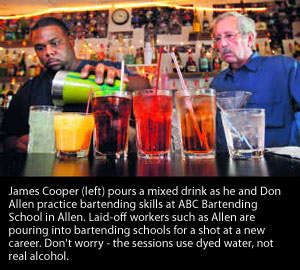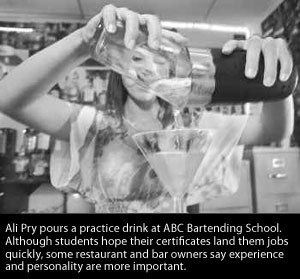Take a look at our recent local TV visit, and article by The Dallas Morning News at our Dallas school location.

Shaken economy stirs up interest in
bartender classes
Saturday, June 6, 2009
By JOHN COLEMAN / The Dallas Morning News
Don Allen's biggest worries used to be instructing
pilots how to perform a barrel roll and not bumping his head in the cramped flight simulator.
Soon his job could depend on remembering whether to salt the rim of a
margarita glass.
barrel roll and not bumping his head in the cramped flight simulator.
Soon his job could depend on remembering whether to salt the rim of a
margarita glass.
Laid off after a 40-year career as a pilot and flight
instructor, Allen turned to one of his longstanding dreams: bartending.
Bartending "is something I have had in the back of my mind for a while;
it's something I might have done for fun one day," Allen said.
Rather than a fun hobby to pick up, it might serve as a financial life
preserver for Allen, who was to graduate Friday. He is one of many
recession casualties who turned to bartending school, looking for
another income option after being laid off – but a certificate in
bartending may not be a quick fix.
Monthly applications to the local branch of the national ABC Bartending
School have increased 15 percent to 30 percent year over year since
December, according to Mark Stephenson, director of the school in
Addison.
Certified drink mixers are on the rise, but area bar owners and recent
bartender school grads agree that with limited jobs available,
experience and a great personality – rather than a certificate – are the
golden ticket.
ABC Bartending School grad Necole Elias said her lack of experience was
a hindrance in the job hunt.
"Being a new bartender, it was tough. Especially in this tough economy,"
she said. Owners want to hire applicants "who have experience with
customers."
Elias said she applied to five bars and received only two calls back
because of the hole on her résumé.
Bartending school is just another bullet point on a résumé to Abby
Starr, general manager of Idle Rich Pub.
"We mostly hire based on personality and experience," Starr said.
"Bartending school won't hurt, but it certainly won't make someone,
either."
Cory Wauson, general manager of Ozona Grill and Bar, said business is up and he is hiring about one server per week, but no bartenders. He said
he's not a "big bartender school person" – applicants have to earn the
position.
and he is hiring about one server per week, but no bartenders. He said
he's not a "big bartender school person" – applicants have to earn the
position.
Bartenders have to work their way up the chain like
everyone else. It is a privileged position. You can teach the bartenders
recipes, but experience is what is really valuable to me," Wauson said.
The appeal of bartending is the ease of picking it up, short training
time and the respectable income bartenders can earn, Allen said.
Bartenders can expect a dismal base salary close to minimum wage,
Stephenson said, but with tips, a bartender can earn $20 to $30 an hour.
The U.S. Bureau of Labor Statistics says that in Dallas-Fort Worth,
full-time bartenders make an average of $19,640 in wages annually, based
on May 2008 figures.
All industries have been hit hard by the recession, Stephenson said, but
the food service industry still needs workers.
"People are losing their jobs and looking for options to turn to,"
Stephenson said. "Happy, sad, rich or poor, people are going to eat and
drink, and they need people to provide that service for them, and it's a
good place for people to look for jobs."
Despite many restaurants downsizing, applications are still rolling in.

Wauson said his Ozona Grill is experiencing a spike
in applications it hasn't seen in 10 years. Many of the applicants are
returning to their roots, he said.
"We are seeing a lot of business professionals returning to what they
did in their youth to earn money after being laid off," he said.
It's the same story for bartending school applications.
A larger, more diverse and educated group of applicants than usual is
entering bartending school these days, said Stephenson.
"Usually this time of year, we see a lot fresh high school grads, but we
are really starting to see the older crowd come in, many in their 30s,
40s and 50s," Stephenson said.
Phil Seger, 60, is a former senior project manager and 19-year industry
veteran for a major telecom company. He recently purchased some
ranchland in Fannin County to retire on. He was laid off five years
before he planned to retire.
"I saw firsthand how rough the job market was," Seger said. "I tried to
find a job for a year and a half and must have sent out several hundred
résumés; no luck, because I was overqualified for most jobs I applied
for."
After 18 months of frustrating results on the job hunt, a friend
recommended Seger give bartending school a try.
"A friend of mine gave me the idea, and I am just loving every minute of
it," he said. "I'm not sure I would ever want to go back to the
corporate world."
Kacy Oden, director of membership relations for People Report, a Dallas
restaurant research and consulting firm, said age wouldn't play a role
in keeping older bartender applicants out of the industry.
"They definitely stand a chance in this industry," Oden said. "There are
a lot of bars out there for the baby boomer generation, and they like to
see someone like them behind the bar."
Students from 18 to 70 are attending the weeklong bartending program,
and Stephenson said more of them have bachelor's and master's degrees
than ever before.
"We are seeing a lot of educated professionals come through the doors.
Some people have jobs for 20 or 30 years when they get laid off and come
to us," he said.
Some bartending students don't wait until they get laid off to make a
move.
James Cooper still has his job in the airline industry. With times still
difficult, workers have to be prepared, he said.
"There still could be another big layoff coming. You have to be ready;
you can't wait until the end to do something," Cooper said.



